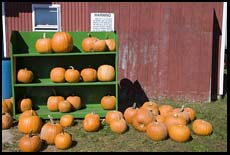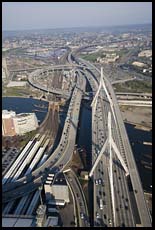
Canon EF 24-105/4L IS USM Lens Review
by Philip Greenspun; created February 2007
Site Home : Photography : EF 24-105/4 IS

by Philip Greenspun; created February 2007
Site Home : Photography : EF 24-105/4 IS
The Canon 24-105/4L IS lens is reasonably high quality, reasonably fast, reasonably wide range, and reasonably light. It is designed for the latest generation of full-frame digital SLRs such as the 5D. If you want a high quality wide-to-telephoto zoom and plan to take photos from a moving car, boat, or airplane, this is the right lens.
Producing a high quality 4:1 zoom lens is challenging, but the "L" in "Canon 24-105L" assures you of professional quality images, rugged construction, and substantial weather-proofing. The 24mm wide end is wide enough to be dramatic and the 105mm telephoto end is long enough to provide a significant flattening effect for portraits. With the light weight achieved by designing for an f/4 rather than an f/2.8 aperture, the 24-105/4L is a great travel lens.

Is f/4 with image stabilization just as good as the f/2.8 on most professional zooms or the f/1.4 on a prime lens? Click on the image at right, captured at 1/30th of a second. The image stabilizer ensured that the effects of camera shake were minimized. The paintings and the text on the wall are not blurred. However, the image stabilizer will not stabilize the motion of objects within the frame. This could have been a fun photo with the guy at right staring into the camera. At 1/30th, though, his walking motion renders him blurry. With a 50/1.4 lens, the shutter speed could have been a motion-stopping 1/250th of a second.

If you don't need the zoom and love to take photos in dim light, consider the 50/1.4. It is three f-stops faster than the 24-105/4, and, despite the lack of image stabilization, is more useful in low light.
If you don't need the range on the telephoto end and don't plan to take pictures from moving platforms, you'll get higher image quality from 24-70.
This is an EF lens, casting an image circle large enough to cover a 24x36mm piece of film or the sensor in Canon's more expensive "full-frame" digital SLRs. The camera will work fine on a small-sensor body, but you will be carrying around more lens than you need and the focal length will be a "slighty-wide-to-telephoto" range.
Shutter speeds slower than 1/30th of a second...
From a Boston helicopter tour....
The house where I grew up and where I've been living more recently...
Day to day photography...

| Focal length | 24 - 105 mm |
|---|---|
| Maximum aperture | F4.0 |
| Minimum aperture | F22 |
| Angle of view | • Horizontal: 74° - 19° 20' • Vertical: 53° - 13° • Diagonal: 84° - 23° 20' |
| Lens construction | 18 elements in 13 groups |
| Diaphragm blades | 8 |
| Closest focusing distance | 45 cm (17.7 in) |
| Maximum magnification | 0.23x (at 105 mm) |
| Distance information | Yes |
| Image stabilizer | 3-stops |
| AF actuator | Ring USM (full-time manual focus built-in) |
| Filter diameter | 77 mm |
| Dimensions (dia x len) | 83.5 x 107 mm |
| Weight | 670 g (1.5 lb) |
| Magnification with extension tubes | EF 12 II: 0.40 - 0.12 EF 25 II: 0.61 - 0.27 (only at tele) |
| Lens hood | EW-83H |
| Soft case | LP1219 |
| Extenders | EF 1.4x II: Not compatible EF 2.0x II: Not compatible |
Text and pictures copyright 2006-2007 Philip Greenspun